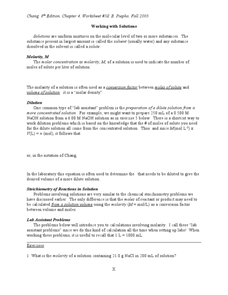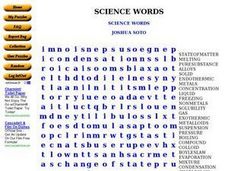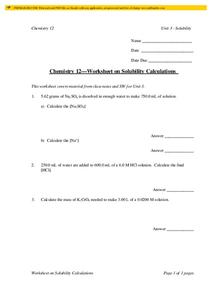Teach Engineering
Concentrate This! Sugar or Salt...
Heat up your lessons on boiling points. The resource provides a three-part activity: first, groups find the boiling point of solutions; second, they create boiling point curves for salt and sugar solutions; and third, they mix a solution...
US Environmental Protection Agency
Role of Plants in Water Filtration
Investigate the amazing ability of plants to filter contaminants from water with this series of in-class demonstrations. After placing six small, potted plants in plastic cups, different solutions and mixtures are poured into them that...
Curated OER
What Properties Do Solutions Have?
In this solutions worksheet, students will write down two properties that solutions have and then will come up with a conclusion about solutions based on their facts.
Curated OER
Mixtures, Percentage and Equation Stoichiometry
In this chemistry worksheet, students answer 2 problems on solution stoichiometry. They calculate the mass of products formed given a certain amount of reactant.
Curated OER
Exploring the Scientific Method: Separation of a Complex Mixture
Students work in teams to use the scientific method to separate complex mixtures into pure components.
Curated OER
Working with Solutions
In this solutions worksheet, students review how molarity is calculated and how to prepare a dilute solution. This worksheet has 5 problems to solve.
Cornell University
Unknown Powders
Create a little scientific magic within your classroom! Learners mix powders and liquids and identify chemical reactions. Based on the reactions, individuals determine the identity of various powders.
Curated OER
The Separation Problem
In this mixture separation instructional activity learners problem solve a variety of ways to separate mixtures. After generating solution ideas to separating mixtures of solids prompts on the one page sheet students are prompted to...
Curated OER
Heat Transfer & Phase Changes
In this heat transfer and phase change worksheet, students experiment with ice, salt, and milk to show the relationship between the temperature of a solution and its phase. Students turn milk from a liquid to a solid and graph the...
Curated OER
Matter Overview
There is not much information in this presentation. It serves more as a guide to direct the flow of your introductory chemistry lecture. Each slide displays a large title and a smaller phrase meant to explain it. For example, one title...
Aquarium of the Pacific
States of Matter: Making Ice Cream
Who knew that learning about the states of matter could taste so sweet? This fun hands-on lesson captures the attention of learners as they use what they know about solids, liquids, and gases to create their very own batch of ice cream.
America's Blood Centers
My Blood, Your Blood
Dracula isn't the only one who needs blood to survive. The eight-part unit includes seven lessons, five demonstrations, seven labs, and a project to organize a blood drive. Class members learn about the parts of blood, the form and...
Royal Society of Chemistry
A Solid-Solid Reaction between Lead Nitrate and Potassium Iodide
Why is it so difficult to make two solid compounds react? Investigate the concepts of particle collisions and rate of reaction using a quick demonstration. The colorful experiment features two plain, white solids combining to form a...
American Chemical Society
Energy Changes in Chemical Reactions
Some chemical reactions produce heat, but what is really going on? Lesson focuses on the concept of energy changes, both exothermic and endothermic. Scholars perform multiple experiments, hands-on activities, and view videos of the...
Curated OER
Science Words
In this general science instructional activity, students find 32 science words reviewing states of matter and types of substances. Students may self correct by selecting the link at the bottom of the page.
Curated OER
What is a Solution?
In this solutions worksheet, students read about how people first learned to use metals and to combine metals to form alloys. Students write an essay telling the story of how ancient people first learned to cause physical changes in metal.
Curated OER
Solubility
In this solubility worksheet, students calculate the final concentrations of the ions involved in a chemical mixture. Students calculate the solubility of different compounds. This worksheet has 13 problems to solve.
Curated OER
Classification of Changes
In this classification of changes worksheet, students identify each example as either chemical or physical changes. Students also classify other examples as either element, compound, solution, colloid, or suspensions. In the other...
Curated OER
Solids and Water
Students investigate mixtures made of water and familiar solid materials. They observe and discuss the changes that occur immediately and set the mixtures aside for a day. Finally, students observe the mixtures, note changes, and graph...
Curated OER
It's a Mixed Up World!
Middle schoolers examine the importance of applying the scientific knowledge of elements, mixtures, and compounds to manufacture consumer goods and conduct civil operations, such as water purification. They also practice categorizing...
Curated OER
Mixtures
In this mixtures pre-lab worksheet, learners compare and contrast suspensions and colloids and solutions and colloids. Students describe the Tyndall effect. This worksheet has 10 short answer questions.
Curated OER
Mixtures as Solutions or Colloids and the Tyndall Effect
Students classify mixtures as solution or colloids by virtue of the Tyndall Effect. They make a cone and tape to fit over the lens of the flashlight. They turn out the lights in the room and shine the flash light at each of the jars and...
Curated OER
SEPARATION OF A STARCH-GLUCOSE MIXTURE USING GEL FILTRATION
Students make a starch-glucose solution and pour it through gel in order to separate the starch from the glucose. They examine how starch is a larger molecule than glucose and test for the presence of these substances using other...
Curated OER
Science Lesson #2
Fourth graders explore and experiment with objects that float to see if they float differently in salt water or fresh water. After the experiment, they write a paragraph in their science journal explaining how fresh water and ocean water...

























